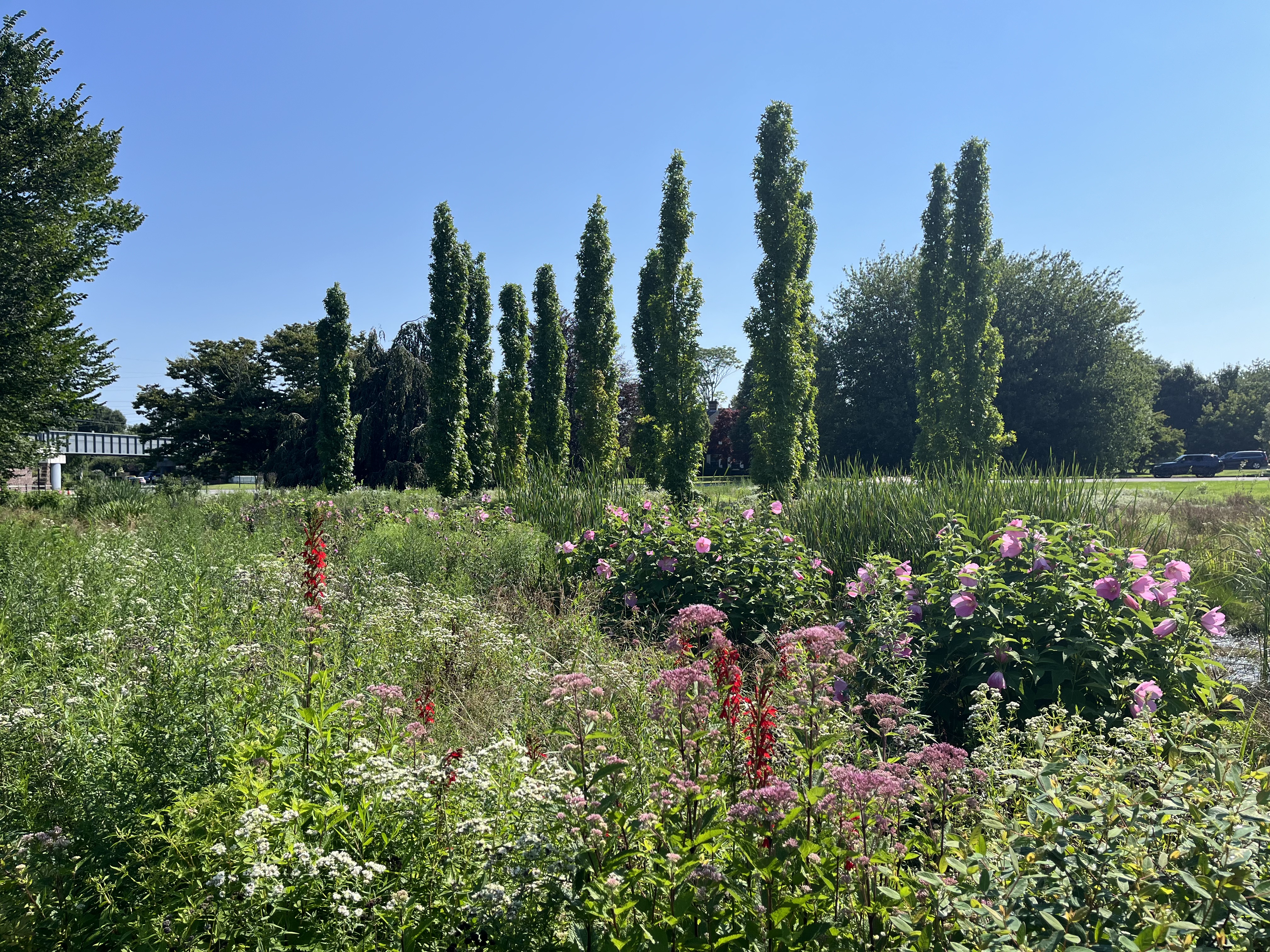
Methodist Lane Bioswale
Making stormwater capture beautiful
The Methodist Lane bioswale was constructed in 2021 as a part of the Surfrider Foundation's Ocean Friendly Gardens program with the help and support of local community partners and volunteers.The Methodist Lane Bioswale Ocean Friendly Garden receives stormwater and road runoff from a large watershed of over 800 acres that extends up N. Main street towards 3-Mile Harbor.
The bioswale is contoured with gently sloped sides and planted with native plants. Their deep root systems help soak up the water that flows into the bioswale, filtering pollutants such as fecal bacteria and sediments and absorbing nutrients such as nitrogen and phosphorous. This helps reduce polluted runoff that reaches downstream waters in Hook Pond and eventually the Atlantic Ocean at Main Beach.

See the bioswale in action
Before the bioswale was planted in 2021, the site often had standing water, and when it rained the runoff traveled right across the lawn and into the headwaters of Hook Pond, washing pollution directly into the water. The OFG bioswale now intercepts this flow of polluted water, slowing it down, filtering out pollution, and helping the stormwater soak into the ground so there is less pollution flowing to Hook Pond.

After the rain


Measuring the garden's impact by testing the water
Surfrider pulls weekly water samples from Methodist Lane just before the culvert on the south end of the garden, if there is any standing water to collect.
Before the bioswale was planted, our sampling days of standing water were more frequent. We collected 14 samples in 2018, 18 samples in 2019, and 12 samples in 2020. Over the last 3 years as the garden as grown in, we see standing water on site less often because the bioswale is working to filter and absorb stormwater. In 2023, we only collected 5 water samples here, 9 in 2024, and only 4 samples so far in 2025.
habitat for biodiversity

Planting for pollinators
The Methodist Lane Bioswale supports pollinators through native plants that have coevolved with our local bees, butterflies, moths, and more. Pollinator plants often have beautiful flowers and can bring color and life to your yard at home while supporting biodiversity.
preventing runoff pollution

Planting for rain
Wetland plant species are specially adapted to survive wet conditions and flooding that other plants can't tolerate. Their long roots soak up rainwater to prevent stormwater pollution while supporting healthy, living soil. Wetlands plants are a great addition to rain gardens in your yard to prevent water pollution from your roof at home.
filtering water and storing carbon

Making meadows
Meadow plants have long root systems that anchor them into the soil, much longer than turf grass in traditional grass lawns. These roots absorb and filter water deep into the ground, while storing more long term carbon than non-native grasses. Meadows support wildlife through flowers, nest material for birds, habitat for beneficial insects, and food for herbivores. Meadow plants can add texture and color to your yard while supporting clean water, habitat, and climate.

1 Flooding before the construction of the bioswale.

2 Construction of the bioswale.

3 Planting in the bioswale.
.jpg?width=1200&length=1200&name=DJI_0898%20(1).jpg)
4 The bioswale viewed from above with the first installation of plants.

The flowering meadow is now a haven for local pollinators and wildlife

The extensive root systems of native plants soak up and filter rainwater, preventing flooding

These native flowers and plants support local biodiversity and resilient habitat for wildlife
Volunteer with us
Let's grow together
Plant your own bioswale
Get involved
- Learn more about Ocean Friendly Gardens
- Getting Started with Ocean Friendly Gardens: Free Beginner's Guide
- Common weeds at Methodist Lane
- Want to lend a hand? email ofg@easternli.surfrider.org



